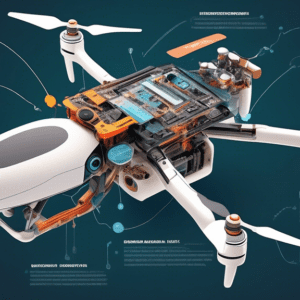What Do Drones Do? Exploring the Diverse Functionality of Drones
Drones, also known as unmanned aerial vehicles (UAVs), have soared beyond their initial military applications to become versatile tools across various industries. From aerial photography to package delivery, drones offer a wide range of capabilities. But what exactly do drones do? Let’s delve into the multifaceted functionality of these modern marvels.
1. Aerial Photography and Videography: Capturing Stunning Perspectives
Drones have revolutionized the way we capture aerial imagery. Equipped with high-resolution cameras and advanced stabilization systems, drones can capture breathtaking photos and videos from unique vantage points. This capability has transformed industries like:
- Filmmaking and Photography: Drones provide filmmakers and photographers with dynamic shots and perspectives previously unattainable without expensive helicopters.
- Real Estate: Showcase properties from captivating angles, offering potential buyers a comprehensive view of the property and its surroundings.
- Construction: Monitor construction progress, inspect infrastructure, and create detailed aerial surveys of project sites.
2. Delivery and Logistics: Streamlining Transportation
The use of drones for delivery is rapidly gaining traction. Drones offer a faster, more efficient, and cost-effective solution for transporting goods, particularly in areas with challenging terrain or traffic congestion. Their applications in delivery and logistics include:
- Package Delivery: Companies like Amazon are exploring drone delivery to expedite package transportation, reducing delivery times and costs.
- Medical Supply Delivery: Drones can deliver essential medical supplies, including blood and organs, to remote areas or disaster zones, saving lives and improving healthcare access.
- Inventory Management: Drones can scan and track inventory in warehouses and distribution centers, optimizing logistics and reducing errors.
3. Agriculture: Enhancing Farming Practices
Drones are transforming the agricultural landscape by providing farmers with powerful tools to improve crop management, increase yields, and reduce costs. Their applications in agriculture include:
- Crop Monitoring: Drones equipped with multispectral or hyperspectral cameras can capture images that reveal plant health, stress levels, and irrigation needs, enabling farmers to take targeted actions.
- Precision Spraying: Drones can precisely apply fertilizers, pesticides, and herbicides, reducing chemical usage and minimizing environmental impact.
- Livestock Monitoring: Drones can herd livestock, monitor their health, and detect potential issues, improving animal welfare and farm efficiency.
4. Surveillance and Security: Enhancing Safety and Monitoring
Drones provide a versatile platform for surveillance and security purposes, offering a bird’s-eye view of areas and enabling real-time monitoring. Their applications in surveillance and security include:
- Law Enforcement: Drones assist law enforcement agencies in search and rescue operations, crime scene investigation, and traffic monitoring.
- Border Patrol: Drones enhance border security by patrolling vast areas, detecting illegal crossings, and providing real-time situational awareness.
- Infrastructure Inspection: Drones inspect bridges, power lines, pipelines, and other critical infrastructure for damage, corrosion, or potential safety hazards.
5. Search and Rescue: Aiding in Emergency Response
Drones play a crucial role in search and rescue operations, enabling rapid deployment and coverage of vast areas, often inaccessible by traditional means. Their applications in search and rescue include:
- Locating Missing Persons: Drones equipped with thermal cameras can detect heat signatures, aiding in the search for missing hikers, climbers, or individuals lost in wilderness areas.
- Disaster Response: Drones provide aerial views of disaster zones, assessing damage, identifying survivors, and guiding rescue efforts.
- Mountain Rescue: Drones deliver essential supplies to climbers stranded in remote or inaccessible areas, providing life-saving support.
6. Environmental Monitoring: Protecting Our Planet
Drones are invaluable tools for environmental monitoring, providing insights into ecosystem health, wildlife populations, and environmental changes. Their applications in environmental monitoring include:
- Wildlife Conservation: Drones track animal movements, monitor populations, and assess habitat health, supporting conservation efforts.
- Forestry Management: Drones map forest areas, monitor tree health, and detect signs of deforestation or disease, aiding in sustainable forestry practices.
- Pollution Monitoring: Drones equipped with sensors can detect air and water pollution, providing data for environmental protection initiatives.
7. Research and Exploration: Unveiling New Discoveries
Drones are expanding the horizons of research and exploration, enabling scientists and researchers to gather data from challenging or inaccessible locations. Their applications in research and exploration include:
- Archaeology: Drones create aerial maps of archaeological sites, revealing hidden structures and providing valuable insights into ancient civilizations.
- Oceanography: Drones study marine life, map ocean floors, and monitor ocean currents, contributing to our understanding of the marine environment.
- Volcanology: Drones collect data from active volcanoes, monitoring volcanic activity, and providing early warnings of potential eruptions.
8. Entertainment and Recreation: Enhancing Leisure Activities
Beyond their practical applications, drones have also become popular recreational tools, offering enthusiasts new ways to enjoy hobbies and explore the world from unique perspectives. Their applications in entertainment and recreation include:
- Drone Racing: Drone racing is a rapidly growing sport where pilots navigate drones through challenging courses at high speeds, testing their skills and agility.
- Aerial Photography and Videography: Hobbyists use drones to capture stunning aerial footage of landscapes, events, and their adventures, sharing their unique perspectives with the world.
- Drone Light Shows: Choreographed drone light shows create mesmerizing aerial displays, captivating audiences with synchronized movements and vibrant colors.
Conclusion
Drones have become an integral part of modern society, impacting a wide range of industries and aspects of our lives. From aerial photography and delivery to agriculture, surveillance, and environmental monitoring, the functionality of drones continues to evolve, offering new possibilities and transforming the way we live, work, and explore our world. As technology advances, we can expect even more innovative applications for drones, further expanding their impact on society.
